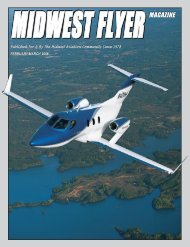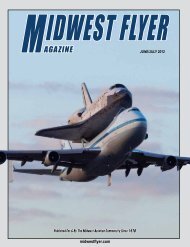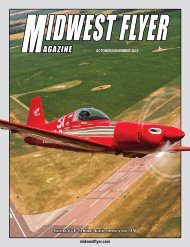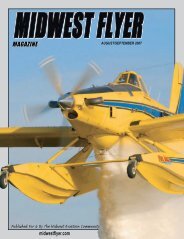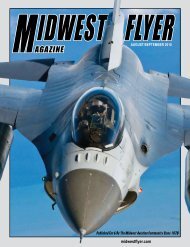minnesota - Midwest Flyer
minnesota - Midwest Flyer
minnesota - Midwest Flyer
You also want an ePaper? Increase the reach of your titles
YUMPU automatically turns print PDFs into web optimized ePapers that Google loves.
An airman<br />
recently<br />
asked me<br />
whether he needed<br />
to report an aircraft<br />
“mishap” in which<br />
he was involved, to<br />
the Federal Aviation<br />
Administration<br />
Gregory J. Reigel<br />
(FAA) or National<br />
Transportation<br />
Safety Board (NTSB). When I told<br />
him it would depend upon exactly<br />
what type of “mishap” he was referring<br />
to, he provided me with a more<br />
detailed explanation of what had happened.<br />
With this information in hand,<br />
and a quick review of 49 CFR Part<br />
830 (also known as NTSB Rule 830),<br />
I was able to tell him that he did not<br />
need to report his “mishap.”<br />
Unfortunately, quite a few airmen<br />
AN ATTORNEY THAT KNOWS AVIATION!<br />
For aviation legal matters,<br />
don’t waste time and money<br />
educating an attorney<br />
about aviation, when you can hire<br />
a pilot /attorney with experience.<br />
Greg Reigel – Aviation Attorney<br />
Reigel & Associates, Ltd.<br />
★ FAA Regulatory/Certificate Actions<br />
★ Aviation & Commercial Transactions<br />
★ Licensed In Minnesota & Wisconsin<br />
★ Member, AOPA Legal Services Panel<br />
(952) 238-1060<br />
Email: greigel@aerolegalservices.com<br />
WWW.AEROLEGALSERVICES.COM<br />
AVIATION LAW<br />
The Do’s & Do Not’s of Aircraft Accident & Incident Reporting<br />
by Gregory J. Reigel<br />
Attorney At Law<br />
are either uncertain of or unfamiliar<br />
with the reporting requirements of<br />
Part 830 and they don’t discuss the<br />
issue with an aviation attorney prior<br />
to making the decision whether to<br />
report. This is unfortunate because<br />
some airmen have reported aircraft<br />
incidents when they were not obligated<br />
to make the report and have drawn<br />
undue attention from the FAA.<br />
Knowing when you are required to<br />
report and when you are not, can save<br />
an airman a lot of unnecessary grief.<br />
Who Do You Notify?<br />
Part 830.5 requires that the operator<br />
of an aircraft provide notification<br />
of any “accident” and certain “incidents”<br />
immediately. It is important to<br />
note that you must notify NTSB, not<br />
the FAA. The NTSB is a federal<br />
agency separate from the FAA and it<br />
has the authority to investigate aircraft<br />
accidents and reportable incidents.<br />
Although NTSB delegates<br />
some accident investigation to the<br />
FAA, the notification required by Part<br />
830 must be made to NTSB.<br />
The notification must be given to<br />
NTSB immediately. Part 830.6 states<br />
that the initial notification must<br />
include the following information: (1)<br />
Type, nationality, and registration<br />
marks of the aircraft; (2) Name of<br />
owner, and operator of the aircraft;<br />
(3) Name of the pilot-in-command;<br />
(4) Date and time of the accident; (5)<br />
Last point of departure and point of<br />
intended landing of the aircraft; (6)<br />
Position of the aircraft with reference<br />
to some easily defined geographical<br />
point; (7) Number of persons aboard,<br />
number killed, and number seriously<br />
injured; (8) Nature of the accident,<br />
the weather and the extent of damage<br />
to the aircraft, so far as is known; and<br />
(9) A description of any explosives,<br />
radioactive materials, or other dangerous<br />
articles carried.<br />
In addition to the initial notification,<br />
a written report of an accident<br />
must be made on NTSB Form 6120<br />
and filed with the nearest NTSB field<br />
office within 10 days of the accident,<br />
or for a reportable incident, only as<br />
requested by an authorized representative<br />
of NTSB. The form is available<br />
from NTSB field offices and can also<br />
be obtained from the local FAA Flight<br />
Standards District Office (FSDO).<br />
Who Is Required<br />
To Provide The Notification?<br />
The rule defines an “operator” as<br />
“any person who causes or authorizes<br />
the operation of an aircraft” which can<br />
include the owner, lessee, or anyone<br />
flying or using the aircraft. Please note<br />
that this does not necessarily mean the<br />
pilot. An aircraft owner or fixed base<br />
operator can make the report even if<br />
the pilot does not. However, if someone<br />
other than the pilot makes the<br />
report, Part 830.15(b) requires that the<br />
crewmembers, if they are physically<br />
able at the time the report is submitted,<br />
attach a statement providing the facts,<br />
conditions, and circumstances relating<br />
to the accident or incident as they<br />
appear to him or her. If the crewmember<br />
is incapacitated, he or she must<br />
submit the statement as soon as he or<br />
she is physically able.<br />
Accident, Incident or Neither?<br />
Although the terms “accident” and<br />
“incident” have commonly understood<br />
meanings, for purposes of this rule you<br />
must understand the meanings defined<br />
in Part 830.2 in order to determine<br />
whether you are dealing with an accident,<br />
a reportable incident, or neither.<br />
Under the Rule, an “accident” is<br />
“an occurrence associated with the<br />
operation of an aircraft which takes<br />
place between the time any person<br />
boards the aircraft with the intention<br />
of flight and all such persons have<br />
disembarked, and in which any person<br />
suffers death or serious injury, or<br />
in which the aircraft receives substantial<br />
damage.”<br />
Although “death” is easily understood,<br />
the rule provides specific definitions<br />
for the terms “serious injury”<br />
22 MIDWEST FLYER MAGAZINE OCTOBER/NOVEMBER 2007



